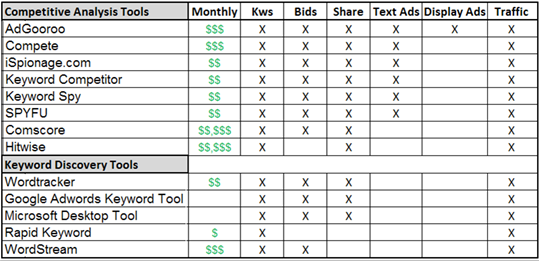Tips For Spying On Your PPC Competitors
Spying is such a loaded word, isn’t it? Spying evokes images of stakeouts on dark streets, dumpster diving to dig up old phone records, elaborate electronic eavesdropping and bugged lampshades. In the corporate world, we prefer to use the softer, more professional reference to competitive intelligence gathering. What ever you prefer to call it, keeping track of competitors is […]

Spying evokes images of stakeouts on dark streets, dumpster diving to dig up old phone records, elaborate electronic eavesdropping and bugged lampshades.
In the corporate world, we prefer to use the softer, more professional reference to competitive intelligence gathering. What ever you prefer to call it, keeping track of competitors is something we all do in one way or another.
The Value Of PPC Competitive Intelligence
I think the two first things that usually come to mind for PPC competitive analysis are keywords and bids. We all want to know what keywords our competitors are using and how much they are paying for them. This certainly would be important data to have, but the real value of competitive intelligence comes when you can know not only what your competitors are doing right now, but what they are likely to do and when they are likely to do it.
It is much more interesting to go beyond the obvious tactical questions and try to answer larger, more strategically important questions, such as:
- How big is our opportunity?
- How much are our competitors investing in paid search?
- Are we investing enough in paid search?
I like to delineate our three primary uses for competitive intelligence: benchmarking and forecasting, tracking day-to-day competitor tactics, and forensics.
Benchmarking/Forecasting
By collecting and analyzing information about your competitors, you can start to develop models to understand what your competitors are investing in PPC, individually and as a a group.
In some cases, you can find direct information by reading SEC filings, press releases and even their Twitter feeds. Once you establish your current place in the competitive pecking order, you can develop forecast models to plan for your own future PPC ad spends.
Tracking day-to-day tactics
In highly competitive and seasonally-active markets, it is important to know what your competitors are doing and when they do it. It is never a good idea to have your boss or your client make you aware that a key competitor has been running a promotion for the past two weeks that you could have known about within hours or days.
With the right PPC tracking programs in place, you should know very quickly when competitors change ads, significantly change bids (drastic shifts in their or your average ad positions), offer special price promotions and develop new landing pages. The more quickly you can discover these changes, the more quickly you can counter their moves.
Forensics
In the wild-west of the Internet, there are always cowboys who play fast and loose with the rules, and a constant influx of new competitors who may or may not actually know what the rules are.
A good competitive intelligence program will allow you to identify and quickly address things like ad double-serving, non-authorized use of your trademarks, ads that violate editorial policies, websites where your content has been completely copied, suspicious clicking patterns from a competitor’s IP address, and so on.
The sooner you identify bad behavior and report it to Google, Microsoft, and/or your legal team, the sooner you can dampen the impact of a competitor’s improper PPC advertising.
Studying Your Competitors
There is plenty of information you can glean from search results pages through simple observation and by asking yourself a few smart questions along these lines:
Ads
- How many ads are they running?
- How quickly do they react to ad copy changes you make?
- How often do they put new ads into rotation?
Landing Pages
- How many different landing pages do they use?
- What sort of offers/calls to action do they use that you don’t?
- How often do they update landing pages?
- How good is their SEO, and page construction on their website/ landing pages?
Tracking
- Are they tracking clicks? Ads? Keywords?
- What sort of analytics do they use?
These are just a few starter questions that will help you gauge your competitors’ level of sophistication and aggressiveness.
The more time you spend and the deeper you go with your competitive intelligence program development, the more questions you’ll develop. It doesn’t take long before you can start to make predictions about your competitors’ behavior and how they are likely to respond to your own campaign adjustments.
Manual vs. Automated Data Collection
While it it possible to collect plenty of data manually, you will quickly realize that tools can greatly improve not only the accuracy of your data collection, but also the volume and breadth.
For example, your repeat searches on Google from the same IP address will give you much different results than others will typically see in the SERPs.
Keyword research and competitive analysis tools can range anywhere from free to over $10K per month, and there are plenty of them out there. The table below lists a few tools we’ve used from time to time to collect data and some of their key features and approximate costs.
(I apologize upfront to any tool vendors not on the list, or if I’ve misstated any of your current features. Please feel free to correct the record in the comments section below.)

PPC Competitive Analysis Tools
All tools have their unique methodologies for gathering and reporting data, so results can be wildly different from tool to tool.
Though each tool claims to be better than all the others, we don’t trust any particular data point, but instead, use the data for approximations and to see how the data changes over time. We typically triangulate by using more than one tool for any specific task, especially bid and market share information, and we use our own campaigns as a control.
I’d say AdGooroo is our favorite intelligence tool because of the way it visually presents the data on competitors using rank order charts and data tables. It is also the only tool we know of that collects display ad intelligence, too, a very powerful feature.
SPYFU has a few nice feature that shows when advertisers change ads and charts that show comparative overlap of keyword spaces. Keyword Competitor has some near real-time reporting, and while it is a relatively new tool, it is one worth evaluating.
Ethical Considerations
As with all competitive intelligence activities, it is easy to lose sight of right and wrong, and even to recognize what is legal or illegal. There are many shades of gray in this marketplace.
For example, a strict reading of the Google AdWords Terms of Service could mean that simply clicking on a competitor’s ad is a prohibited activity, as excerpted below:
“4 Prohibited Uses; License Grant; Representations and Warranties. Customer shall not, and shall not authorize any party to: (a) generate automated, fraudulent or otherwise invalid impressions, inquiries, conversions, clicks or other actions…”
Would a single click on a competitor’s ad be deemed invalid and illegal? Certainly if a competitor clicks on one of my ads, I’d consider that invalid. Is it illegal based on AdWords TOS? I don’t suppose Google is interested in shutting down every advertiser who has ever clicked on competitor’s ad, but at the same time, they certainly would be within their rights to do so, and likely reserve it for abusive behavior such as repeated clicks by advertisers maliciously doing so to drive up advertising costs for a competitor.
The ethical dilemma is clear. If it is a generally accepted practice in our market to occasionally click on a competitors’ ads for the purpose of competitive tracking, knowing it is not legal, but knowing that Google won’t likely enforce this policy, is it ethical do it?
That is a risk assessment and decision each of us needs to make, of course, but again an area where I believe the golden rule applies. Do unto others as you would have them do unto you.
Opinions expressed in this article are those of the guest author and not necessarily Search Engine Land. Staff authors are listed here.
Related stories